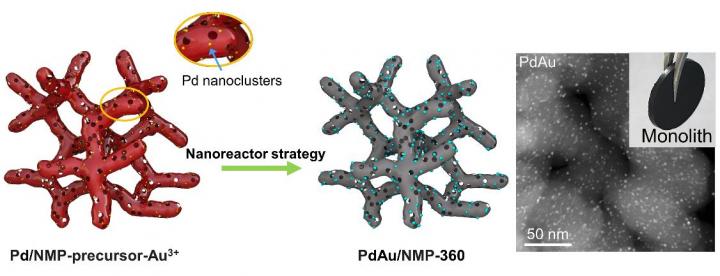
Credit: TIAN Zhengbin
Supported bimetallic catalysts are an important class of catalysts in heterogeneous catalysis. They can be applied in various fields, such as electrocatalysis, biomass conversion, and hydrogen production.
However, traditional impregnation and immobilization methods for synthesizing supported bimetallic nanoparticles (BNPs) are often uncontrollable, thus creating BNPs with non-uniform particle size, low alloy degree and inhomogeneous distribution on the supports. The result is poor catalytic performance and low metal utilization.
To improve the performance and efficiency of the supported BNPs, Prof. WANG Guanghui and Prof. JIANG Heqing from the Qingdao Institute of Bioenergy and Bioprocess Technology (QIBEBT) of the Chinese Academy of Sciences (CAS), in collaboration with Prof. LIU Jian from the Dalian Institute of Chemical Physics (DICP) of CAS, recently proposed a nanoreactor strategy for scalable synthesis of the supported ultrafine BNPs.
This strategy introduces high-quality seeds (Pd nanoclusters) and Au ions into the nitrogen-doped mesoporous polymer (NMP). The NMP is used as a nanoreactor for the seeded growth of PdAu BNPs in solid state during thermal reduction.
“The synthesized Pd1Au1/4 BNPs are very uniform in diameter with an error of 0.5 nm, and are homogeneously dispersed in the NMP support,” said Prof. WANG.
The Pd1Au1/4/NMP sample showed enhanced catalytic performance in formic acid (FA) dehydrogenation compared with the monometallic analogues Pd/NMP and Au/NMP.
“The enhanced activity can be attributed to the electronic interaction between Pd and Au in the Pd1Au1/4 BNPs. In addition, the electronic interaction could be adjusted by changing the composition of PdAu BNPs during synthesis,” said Prof. JIANG.
Moreover, the PdAu/NMP product can be molded into a monolith by a pellet press under mild pressure (1.0 bar) without any binders, due to its coral-like structure. The monolith contains abundant macropores which can be of benefit for mass transfer in a liquid reaction.
Notably, the monolith of Pd1Au1/4/NMP still exhibits considerable activity in FA dehydrogenation with a TOF value of 3684 h-1 at 333 K, and can be recycled five times without mass loss and changes in activity.
Many other supported Pd-based BNPs (diameters ranging from 2-3 nm) have also been synthesized using this method, including PdRu, PdCo, PdNi, PdZn, PdAg and PdCu BNPs.
This proposed nanoreactor strategy provides an effective route for synthesizing various supported bimetallic catalysts. These catalysts are promising for applications in green and sustainable catalytic processes.
###
This study was published in Materials Today on July 30. It was supported by the National Natural Science Foundation of China, QIBEBT and the DNL Cooperation Fund, CAS.
Media Contact
CHENG Jing
[email protected]
Original Source
http://english.
Related Journal Article
http://dx.




